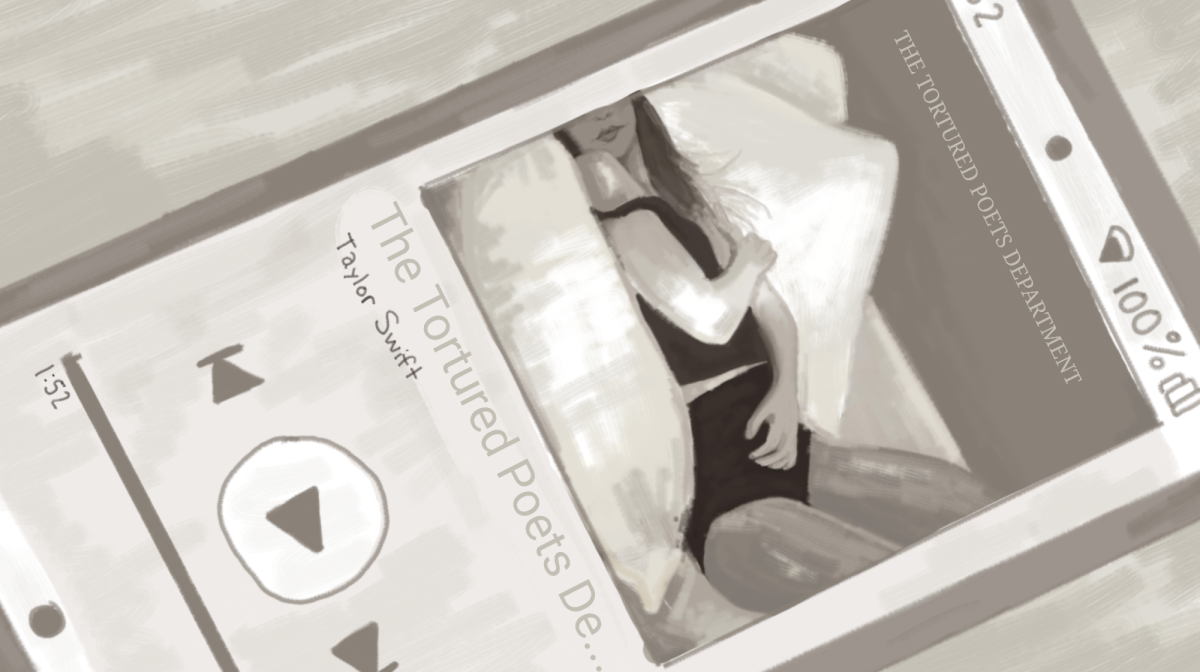The theories about what Taylor Swift’s newest album, “The Tortured Poets Department,” would contain have built the anticipation to its peak preceding the release of the synth-pop album on April 19. This is Swift’s eleventh studio album and her fourth to be released during her year- and-a-half-long “Eras Tour.”
“It’s a lot longer than other albums and it’s also just very deep,” freshman Lucy Haar said.
While accepting a Grammy award for “Midnights” in February, Swift completely surprised many of her fans by announcing a new album instead of “Reputation (Taylor’s Version),” which many were convinced would be announced. Later, Swift curated five playlists on Apple Music representing the five stages of grief and titled them after lyrics in her songs on the new album.
“[I was surprised by] how angry she was in the album,” sophomore Olivia Abeln said. “We were all thinking that it’s gonna be a sad album but it wasn’t. She was like throwing anger aggressively.”
The week of the release, Swift started leaving hidden words in the lyrics of random songs in her discography on Apple Music every day until the release date. The six words found during that week spelled: We Hereby Conduct This Post Mortem. After the release of the album, listeners found that sentence in the song “How Did It End?”
“I was expecting it to have very odd lyrics and I feel like it does,” Haar said.
Going further than ever to promote an album, Spotify set up a pop-up in Los Angeles that took fans inside an open-air library that was, of course, album-themed. Visitors were able to search for easter eggs or hidden lyrics in an immersive way. This along with the constant teasers of new lyrics dropped or videos kept fans on their toes until the release.
“It was actually really cool how they would change out the lyrics in the library,” Abeln said. “Plus, a bunch of my friends were trying to figure out stuff and it was fun to hear all their theories.”
It is well known that Swift releases her albums at midnight ET, but at 2 a.m. she announced that it was a double album with a second installment called, “The Anthology” that includes fifteen additional songs. This included the four songs that were previously called exclusive bonus tracks: “The Bolter”, “The Albatross,” “The Black Dog” and “The Manuscript.”
“I just assumed there’d be a drop at 2 a.m. like everyone else did just because I follow all the TikTok theories,” sophomore Regan Wilson said.
Swift continues to write about historical figures, finding similarities in their lives and turning them into stories. In this album, she does it with “Clara Bow,” a silent film star who was the “It girl” of her time, but her experience with fame was what led to her downfall. Another song, “The Alchemy” is suspected to be about her boyfriend, Travis Kelce, who is a tight end for the Kansas City Chiefs. It is full of football references and uses similar language to a song Swift wrote about her past boyfriend, actor Joe Alwyn. This song in “Reputation” titled “Call It What You Want” contains descriptions of a circus when she compares their love life to everyone around them.
“She was calling people out,” Haar said. “I thought that she was gonna talk a lot about Joe Alwyn and I feel like she did.”
This album can be compared to “Folklore,” “Evermore” and “Midnights,” but it is also still something different from all of her previous works. The lyrics are much more explicit than any other album she’s ever released, but they are also more poetic and intricate. It appears as if Swift has collected the five stages of grief and put them in one album while staying true to her storytelling roots.
“This period of the author’s life is now over, the chapter closed and boarded up,” Swift said in her Instagram post for the release of the album. “There is nothing to avenge, no scores to settle once wounds have healed… Once we have spoken our saddest story, we can be free of it. And then all that’s left behind is the tortured poetry.”















![Ninja Christmas [Comic]](https://FHNtoday.com/wp-content/uploads/2024/12/Ninga-Christmas-Comic-1200x898.jpeg)







